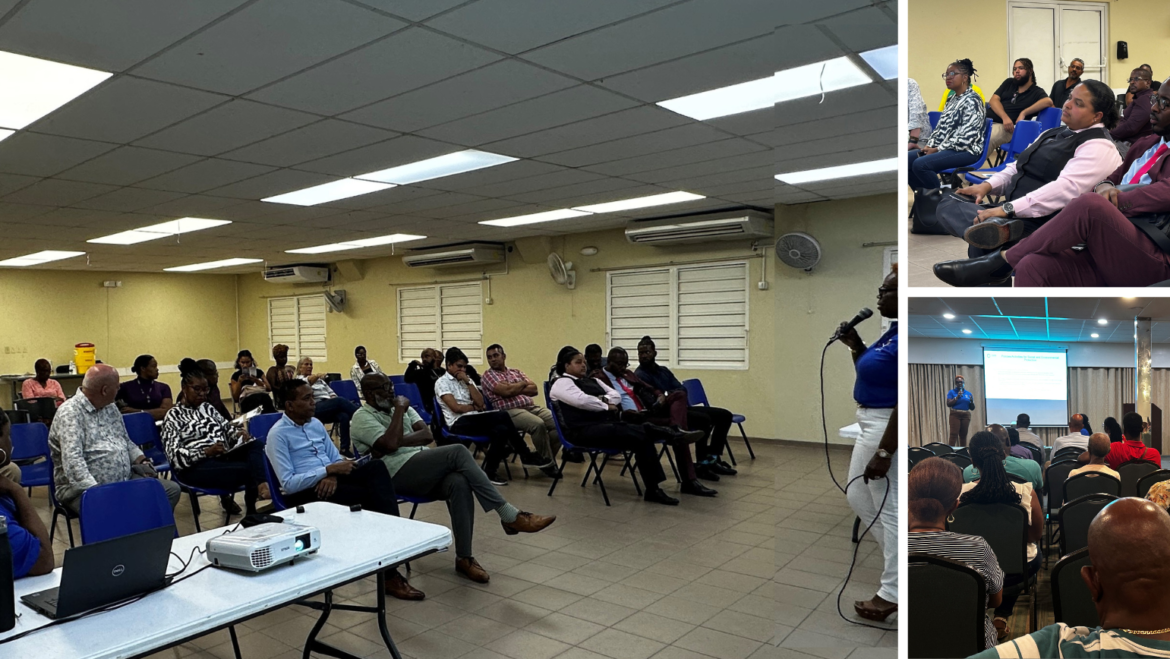The National Recovery Program Bureau (NRPB) has concluded the latest round of community consultations for the Fostering Resilient Learning Project (FRLP). These events, held in early October, were designed to inform and engage residents about the project, which focuses on reconstructing safe educational and cultural spaces as part of Sint Maarten’s ongoing recovery efforts post-Hurricane Irma. This phase of the FRLP includes rebuilding Sister Marie Laurence and Charles Leopold Bell schools, as well as reconstructing the St. Maarten Library.
With the demolition of the three buildings approaching, the consultations provided a platform for neighborhood residents, educators, and community representatives to ask questions, share any concerns and provide input on different aspects of the project. Attendees discussed how the project might affect their communities and offered suggestions for improvements.
At the Sister Marie Laurence premises in Middle Region, the project team reassured neighborhood residents concerned with demolition and noise that these issues would be addressed in the Contractor-Environmental and Social Management Plan (C-ESMP), a plan designed to mitigate and reduce any negative effects on both the community and the environment during construction. This plan will include measures to maintain road access and traffic flow, whilst also minimizing disruptions such as noise and dust pollution. The project team explained that the C-ESMP would be finalized once the demolition contract is signed, and a start date of the demolition work is confirmed.
At the St. Maarten Library session held at the John Larmonie Center, the consultation was highly interactive, with participants asking questions about future programs and the design of the new library spaces. The design firm, KS&P was present, and the FRLP project team explained that once concept drawings are ready, another meeting would be scheduled for community feedback. Residents also expressed concerns about asbestos in the old building. The project manager clarified that an external company conducted assessments, and no asbestos was found.
During the consultation for Charles Leopold Bell School held at Carl’s Unique Inn, there were concerns about the safety of the school’s sports court, currently located near a busy road. The community suggested that the court be relocated to the rear of the school for improved safety. The project team explained that further discussion with MECYS would be needed, as the current mandate for the sports field focuses on repairs, rather than new construction. Additionally, some attendees were confused about a previous asbestos report. The project team assured everyone that all necessary environmental assessments had been conducted, and confirmed there was no asbestos at the three project sites.
Ursel Biabiany, the Stakeholder Engagement Coordinator of the NRPB explained to the community that the NRPB remains dedicated to addressing concerns raised during these consultations and keeping the public informed. “We take the community’s feedback seriously and work closely with all project stakeholders to ensure that the demolition and rebuilding process prioritizes public safety and community concerns.”
“We have made considerable efforts to engage the public, including distributing flyers door-to-door and answering questions directly. This open dialogue has led to productive feedback from the local community, which will help shape our plans moving forward.”
Demolition of each building is expected to last two months, with work set to begin in early 2025. The design phase for the Library and Charles Leopold Bell School will take about seven months, wrapping up by the second quarter of 2025. Following the design phase, contractors will be selected according to World Bank procurement guidelines, and construction is anticipated to start in the first quarter of 2026, lasting up to a year.
To address the concerns of the community, the project team will closely monitor vibrations from demolition activities. Before the work starts, assessments of nearby homes and businesses will be conducted to document their current condition. This will allow the project team to identify potential damage that could be caused during demolition, reassuring residents that their properties are protected.
Claret Connor, NRPB Director, assures the community that the organization is committed to reconstructing educational and cultural facilities that meet modern standards. “These consultations have been invaluable in allowing us to engage with residents directly and take their feedback into account as we work towards delivering safer, stronger, and more sustainable public facilities that will stand the test of time.”
Further consultations are planned, including private meetings for residents with specific concerns. NRPB invites continued feedback from the community via email frlp@nrpbsxm.org and encourages residents to stay informed through regular project updates on www.nrpbsxm.org/frlp.
Any complaints or grievances can be sent to https://nrpbsxm.org/complaints-procedure/
The Fostering Resilient Learning Project is implemented by the National Recovery Program Bureau on behalf of The Government of Sint Maarten under the Trust Fund, which is financed by the Government of the Netherlands and managed by the World Bank.

